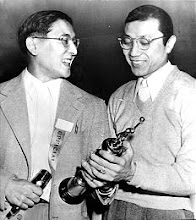While I was there, I heard a truly inspiring speech by Jennifer Hayashida on the state of Asian American Studies in higher education. I was so moved, I asked her to send me a copy of the speech so I could share it with everyone:
2009 APA Heritage Month Celebration
Wednesday, May 13th, 2009
City Council Chambers, City Hall, New York City
Jennifer Hayashida
I am here as an educator at Hunter College, where I have been the Program Coordinator and Acting Director of Asian American Studies for the past two years. So, here’s the good news: about 30% of Hunter’s student body self-identifies as Asian or Asian American. And, the entire CUNY system serves more than 40,000 Asian American students – taken together, that’s as many students as there are enrolled at most large state schools, like one of the larger Penn State campuses, or UCLA.
But, it’s not just about the numbers: Asian American Studies is about more than just serving percentages of Asian American students – it is about how Asian American history is American history, Asian American experience is American experience.
To list just a fraction of what we do in Asian American Studies classes at Hunter, we study the relationships between first generation parents and their second-generation daughters and sons – in other words, we study the lives of you many of you in this room. We look at novels and poetry by Asian American writers; we look at how what happens in Pakistan impacts Asian American communities right here in New York City.
To sum it up, we look at events and experiences from U.S. history that are frequently overlooked or given just one page in the high school history textbook. These big gaps in what students learn lead to gaps in how they experience themselves as Asian Americans – just that term, “Asian American,” means that we insist that we can be both Asian AND American, that we do not have to choose between being foreign and being the invisible model minority. We began this struggle 40 years ago at San Francisco State College, and we still have a lot of work ahead of us.
Right now, I frequently have students who enter my classes with no idea about the 1882 Chinese Exclusion Act, WWII Internment of Japanese Americans, or hate crimes against Filipino men who wanted to marry white women in the 30s. Students don’t know that Chinese Exclusion is a precedent for the Patriot Act, that Japanese Internment predates post-9/11 detention and deportation of South Asians. Students don’t know that Depression-era anti-miscegenation legislation against Asian Americans is currently being examined as part of the legal debate around gay marriage.
Asian American history and experience – our “heritage” – is a cornerstone of American history and identity, but right now it is buried and inaccessible to most of the students, Asian American or not, of our city.
This knowledge is especially vital to our young people who are arriving as first- or 1.5- generation immigrants, who find themselves between cultures and identities, and who are struggling to find a place where they don’t have to pick between being foreigners or being invisible. Learning about their ancestors’ experiences gives them a foothold in America. And, just as importantly, learning about Asian American history can build bridges between Asian Americans and other communities of color.
It is our responsibility to advocate for the rights of our daughters, sons, nieces, nephews, cousins, and, for that matter, fathers and grandmothers, to be able to attend schools in this city and expect to learn about APA heritage, the heritage we are here today to celebrate. That way, we can celebrate the triumphs of people like Fred Korematsu, who ultimately received justice from the Supreme Court, fifty years after he was jailed for refusing to be interned. Or we can celebrate the 1965 Immigration Act, which eliminated the restrictions on immigration from Asia and made it possible for many of us to be here today. Most importantly, we can then truly celebrate the everyday accomplishments of the communities we live in today, because we will have a better understanding of where we come from, the obstacles we have triumphed over, and the work that is left before us.
~ by seouldiva on Wednesday, May 20, 2009.
Guard Brenden Glapion realizes ‘dream’ at Cal
9 years ago




